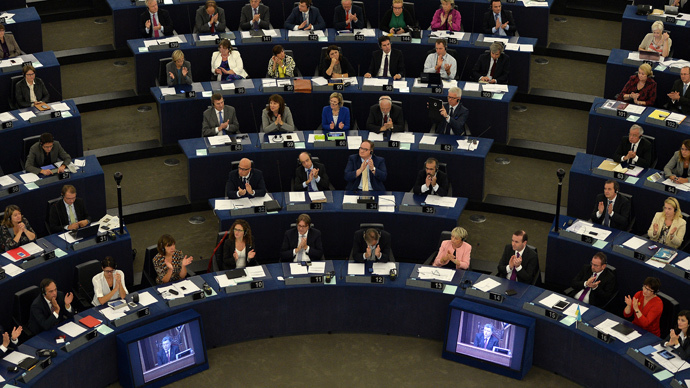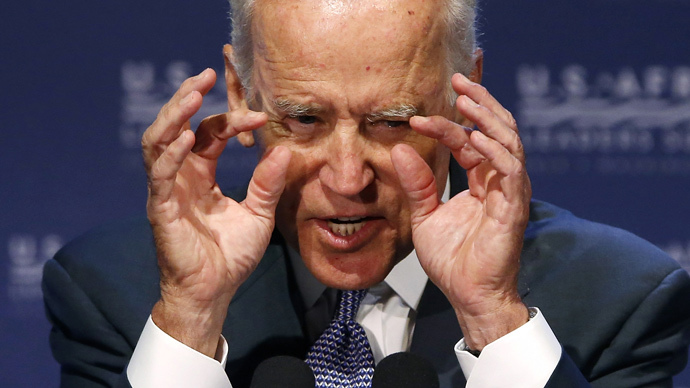America’s leadership had to embarrass Europe to impose economic hits on Russia over the crisis in Ukraine – even though the EU was opposed to such a motion, US Vice President Joe Biden revealed during a speech at Harvard.
“We’ve given Putin a simple choice: Respect Ukraine’s sovereignty or face increasing consequences,” Biden told a gathering at the John F. Kennedy Jr. Forum at Harvard University's Institute of Politics on Thursday.
The consequences were the sanctions which the EU imposed on Russia, first targeting individual politicians and businessmen deemed responsible for the crisis in Ukraine, then switching to the energy, defense, and economic sectors.
“It is true they did not want to do that,” Biden admitted.
“It was America’s leadership and the president of the United States insisting, oft times almost having to embarrass Europe to stand up and take economic hits to impose costs,” the US vice president declared.
READ MORE: Biden blames US allies in Middle East for rise of ISIS

Those costs deemed behind the ruble's historic plunge not only forced America’s ExxonMobil to retreat from Russia’s Arctic shelf, but also provoked counter-measures from Moscow, which suspended certain food imports from the EU.
Russia’s counter-sanctions have hit many of the EU’s agricultural
states. EU members, particularly those close to Russia, were the
most affected by the loss of the Russian market.
For instance, the Netherlands – the world’s second-largest
exporter of agricultural products – is set to lose 300 million
euro annually from canceled business with Russia, as it accounts
for roughly 10 percent of Dutch exports of vegetables, fruit, and
meat.
At the same time, Poland was hit hard by the Kremlin’s sanctions,
as its food exports to Russia totaled $1.5 billion in 2013.
Spain, a large exporter of oranges to Russia, is estimated to
miss out on 337 million euro ($421 million) in food and
agriculture sales, while Italy has estimated its losses at nearly
1 billion euro ($1.2 billion).
Following pressure from local farmers, a 125 million euro EU
Commission Common Agricultural Policy fund was established, from
which the growers are expected to get some cash, while Amsterdam
is willing to cover the cost of transporting excess produce to
eight food banks across Holland.
Overall, Moscow’s one-year food embargo against the EU, the US,
Norway, Australia, and Canada will block an estimated $9 billion
worth of agricultural exports to Russia.
With European countries now at a loss with apple and dairy surplus, it is not exactly clear whether EU producers will be able to return to the Russian markets after the one-year ban expires.
However, this is no secret to the US, as Assistant Secretary of State Victoria Nuland remarked on Thursday.
“Implementing sanctions isn’t easy and many countries are paying a steep price. We know that. But history shows that the cost of inaction and disunity in the face of a determined aggressor will be higher,” Nuland said.
Nuland’s reference to necessary action against the “aggressor” might be taken with a grain of salt by the Europeans, as the “F**k the EU” leak is still fresh in their memory.
The four-minute video – titled ‘Maidan puppets,’ referring to Independence Square in Ukraine’s capital – was uploaded by an anonymous user to YouTube.
READ MORE: 'F**k the EU': Snr US State Dept. official caught in alleged phone chat on Ukraine
Nuland was recorded as saying the notoriously known phrase during a phone call with US Ambassador to Ukraine Geoffrey Pyatt, as the two were seemingly discussing a US-preferred line-up of the Ukrainian government. It apparently referred to Washington’s policy differences with those of the EU on ways of handling the Ukrainian political crisis, with Nuland suggesting to “glue this thing” with the help of the UN and ignore Brussels.
The US State Department did not deny the authenticity of the video and stressed that Nuland had apologized for the “reported comments.”

